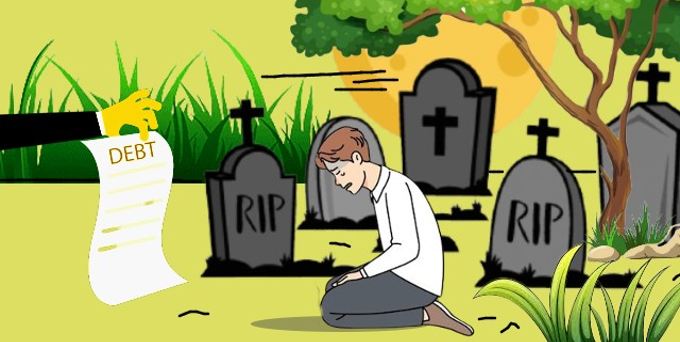Death' is a universal truth and inevitable. You may try but can’t escape from the claws of death. Whenever someone dies, often the family members start thinking about his or her unpaid mortgage bills, auto loan, credit card bills, unpaid income taxes and other debts. The answer is that the debts become a part of the deceased’s estate and usually paid before distributing the remaining assets among the heirs. However, after death debts are very complicated and should be tackled with professional help.
According to Martin Shenkman, an estate and tax-planning attorney in Paramus, N.J, "When somebody dies, the executor or personal representative -- different lingo is used depending on which state you're in -- is charged with marshaling the assets for the estate and paying all the debts."
Ways to find out debts – Chiefly the hidden ones
The nature of the debt, the terms of the deceased’s will and the state law are considered to determine exactly how the debts would be paid off. For instance, if an asset collateralizes a loan, then the loan usually stays with the asset. Therefore, if someone inherits the house will inherit the mortgage as well. Again, someone who inherits a car will be obliged to bear the auto loan. However, usually a deceased’s debts are paid off by the estate.
Apart from these, estate executors and possible heirs should also consider the chances of hidden debts. To make sure there isn’t any, executors usually monitor the deceased’s mail conversations, evaluate his/her most current bank statements and often speak with the deceased’s financial advisors and attorneys.
If the estate is not bankrupt, credit card bills are the easiest debts to be resolved. If credit card companies are informed of the death of the debtor, they often reduce or stop the accrual of interest and fees on the account. Moreover, they often accept a flat payment and stop for the day as they know that resolving an estate take months.
Hidden debts can also come to light when a legal notice is published. Before the estate goes through court systems, the executor needs to publish a declaration especially meant for the creditors and say “I'm the executor or personal representative of the estate, and if we owe you anything, you should tell me.”
Assets – Owned jointly
After death, debts can turn out to be even more complicated if the deceased owned a business or co-signed someone else’s loan. Here, the executor of the estate should first understand the ownership structure of the business and check out the legal wording of any loan guarantees. Therefore, to screen such a complicated issue, legal advice is obviously a wise speculation. Another complication is that in some states some assets like life insurance policy are protected. However, joint ownership or community property usually doesn’t escape this rule. If you own a car jointly with someone else and the person dies, you have to pay the remaining debt on the car. Otherwise, the creditors will take it back.
Not enough equity
If any estate is insolvent, then the executor must find out a way to solve out this complex matter. Due to the recent financial turmoil and poor economy, there is an abundant of such cases. However, if there is not enough money to pay off the debt, then you should know legally what the precedence are of who gets paid and who doesn’t.
"When someone dies, it's a very emotionally charged event for the family and loved ones. When you combine that with the potential of not getting an inheritance but instead having to deal with debt, you're really talking about a hypercharged situation," Shenkman says.












